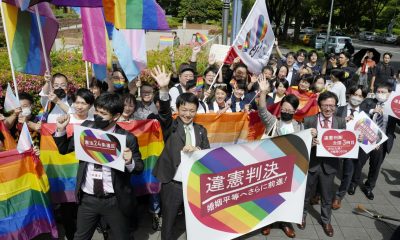News
20th anniversary of legal same-sex marriage in the United States
Mass. in 2004 became first state to allow gays and lesbians to marry
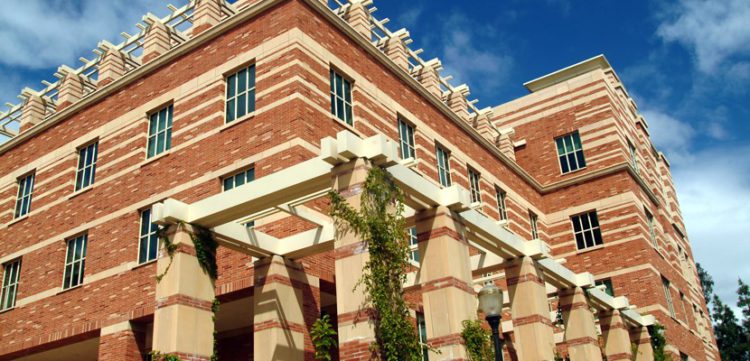
Two decades after Massachusetts became the first state to legalize same-sex marriage, a new study reveals both significant progress and ongoing challenges for married LGBTQ couples in the U.S., with a growing sense of insecurity about the future of their rights.
The Williams Institute at UCLA School of Law surveyed 484 married same-sex couples from all 50 states and D.C. The study, released Monday, marks the 20th anniversary of legal same-sex marriage in the U.S.
Researchers found that 93 percent of respondents cited love as a primary reason for marrying, with 75 percent also mentioning legal protections. Over 83 percent reported positive changes in their sense of security, and 74.6 percent noted improved life satisfaction since marrying.
However, the study also highlighted persistent discrimination and growing concerns about the future. About 11 percent of couples who had a wedding reported facing prejudice during the planning process.
Alarmingly, nearly 80 percent of respondents expressed concern about the potential overturning of the 2015 Obergefell v. Hodges decision, which legalized same-sex marriage nationwide. This anxiety has been exacerbated by initiatives like Project 2025, a conservative policy blueprint that some fear could roll back LGBTQ rights if implemented.
The possibility of a former President Donald Trump victory in the upcoming election has further intensified these concerns. Many respondents cited Trump’s previous U.S. Supreme Court appointments and his statements on LGBTQ issues as reasons for their apprehension. One participant stated, “The thought of another Trump presidency keeps me up at night. We’ve come so far, but it feels like our rights could be stripped away at any moment.”
The current political climate has 29 percent of respondents considering moving to another state, with 52.9 percent citing socio-political concerns as a primary reason. This reflects a growing sense of insecurity among LGBTQ couples about their rights and freedoms.
Brad Sears, founding executive director of the Williams Institute, noted, “The data clearly show that marriage equality has had a profound positive impact on same-sex couples and their families. However, it also reveals ongoing challenges and serious concerns about the future of these rights in light of current political trends and the upcoming election.”
Christy Mallory, legal director at the Williams Institute and lead author of the study, added, “This research provides crucial insights into the lived experiences of same-sex couples two decades after marriage equality began in the U.S. The high level of concern about potential loss of rights underscores the continued importance of legal protections and public support for LGBTQ+ equality.”
The study found that 30 percent of surveyed couples have children, with 58.1 percent of those parents reporting that marriage provided more stability for their families. However, many of these families now worry about the security of their legal status in the face of potential policy changes and shifting political landscapes.
As the nation reflects on two decades of marriage equality, the study underscores both the transformative power of legal recognition and the ongoing need for vigilance in protecting LGBTQ+ rights. The findings highlight the complex reality faced by same-sex couples in America today: Celebrating hard-won progress while grappling with uncertainty about the future, particularly in light of upcoming political events and potential shifts in leadership.
Arts & Entertainment
LA Opera brings back Pride Night for ‘Ainadamar’ production
Pride Night returns at the LA Opera

LA Opera is bringing back its Pride Night on Wednesday May 7, in partnership with the Opera League of Los Angeles.
LGBTQ members and allies will come together for Pride Night to indulge in a performance of “Ainadamar,” at the Dorothy Chandler Pavillion. The discounted tickets for Pride Night include access to a complimentary post-show party at Vespaio hosted by the Opera League of Los Angeles, featuring Cal-Italian bites from Chef Agostino Sciandri.
“Ainadamar” is a powerful tribute to Spanish poet and queer icon, Federico García Lorca.
“This season, we celebrate with ‘Ainadamar,’ a powerful tribute to Spanish poet and queer icon Federico García Lorca. These pairings matter. They highlight that opera is a living, evolving art form—one that speaks to all people and reflects the diversity of the world we live in,” said Christopher Koelsch, president and CEO of LA Opera.
The central plot of “Ainadamar,” which is the Arabic meaning for ‘fountain of tears,’ follows Ana María Martínez as Margarita Xirgu, an actress who spent half of her career portraying Mariana Pineda, who was a 19th-century Spanish liberalist heroine, in Lorca’s play. Pineda was a political martyr who was executed for embroidering a flag with ‘Equality, Freedom and Law,’ in protest of the absolutist Spanish regime.
The production that runs at approximately one hour and 20 minutes, sets the stage for a throwback, recounting Lorca’s life and his last days in the Spanish Civil War.
“At the heart of our Pride Night celebration is the belief that everyone should feel seen onstage and off. Opera is a space for community and belonging, where our audiences can recognize themselves not only among fellow attendees, but also in our artists, our music and the stories we tell,” said Koelsch.
This major company premiere led by Resident Conductor Lina Gonzáles-Granados, is sung in Spanish, with English and Spanish subtitles. Grammy-winning composer Osvaldo Golijov produces the dramatic, flamenco-inspired score that meets the poignant libretto by David Henry Hwang.
During the Covid-19 shutdowns, live performances at the LA Opera were put on hold and the journey to bring back Pride Night among many other in-person performances, was a struggle filled with many moving parts.
“Covid-19 suspended live performances across the board and during our return season we were navigating the different timelines for audiences returning to live theater. It was very much a matter of listening to our community and learning what had changed for them as well as us: some opted for livestream options, others preferred only outdoor events, and so on.”
“Once we found our stride, we were excited to bring back Pride Night the following season during ‘The Marriage of Figaro.’”
This year the LA Opera is celebrating their 40th anniversary launching their 40th Anniversary Campaign to raise resources needed to continue funding their organization.
The show opens on Saturday, April 26 and runs through May 18.
Argentina
Argentina’s transgender community confronts ‘chaotic, desperate’ situation
President Javier Milei has implemented several anti-trans directives

Editor’s note: Washington Blade International News Editor Michael K. Lavers will be on assignment in Argentina through April 12.
BUENOS AIRES, Argentina — A group of Argentine transgender activists with whom the Blade spoke on April 4 said President Javier Milei’s policies have made their community even more vulnerable to violence, discrimination, and poverty.
“The situation is really chaotic, desperate,” said Florencia Guimares García, a travesti activist who is president of the House of Lohana and Diana Civil Association. “There is also a lot of fear among the trans and travestí community towards the government’s policies.”
Guimares’s group is named after Diana Sacayán, a prominent trans activist who was stabbed to death inside her Buenos Aires apartment in 2015, and Lohana Berkins, the founder of the Association for the Fight for Travesti and Transsexual Identity who died in 2016.
Guimares and three other trans activists — Julia Amore, Sasha Solano, and Daniela Ruiz — spoke with the Blade after they participated in a trans and travestí rights forum that took place at an LGBTQ cultural center in downtown Buenos Aires. Alba Rueda, the country’s former special envoy for LGBTQ rights, also took part.
“We are in a bad moment for the rights and quality of life of LGBTQ+ people,” Rueda told the Blade during a February 2024 interview.

Milei took office on Dec. 10, 2023, after he defeated then-Economy Minister Sergio Massa in the second round of that year’s Argentina’s presidential election. Rueda resigned before Milei assumed the presidency.
Milei, an economist and former congressman, shortly after he took office eliminated the country’s Women, Gender and Diversity Ministry.
Milei last year closed the National Institute Against Discrimination, Xenophobia and Racism, a government agency known by the acronym INADI that provided support and resources to people who suffered discrimination based on sexual orientation, gender identity, and other factors. Milei in 2024 also dismissed trans people who the government hired under the Trans Labor Quota Law, which set aside at least 1 percent of public sector jobs for trans people.
Argentina’s landmark Gender Identity Law that, among other things, allows trans and nonbinary people to legally change their gender without medical intervention, took effect in 2012 when Cristina Fernández de Kirchner was president. Milei on Feb. 5 issued a decree that restricts minors’ access to gender-affirming surgeries and hormone treatments.
Gay Congressman Esteban Paulón, a long-time LGBTQ activist, filed a criminal complaint against Milei after he linked the LGBTQ community to pedophilia and made other homophobic and transphobic comments during a Jan. 23 speech at the World Economic Forum in Davos, Switzerland. Millions of people in Buenos Aires and across Argentina participated in marches against Milei that took place less than two weeks later.

Milei is among the heads of state who attended President Donald Trump’s inauguration. Milei also spoke at this year’s Conservative Political Action Conference in National Harbor, Md.
“Violence is more explicit, more common,” Guimares told the Blade, noting police violence has become more common against sex workers who are trans or travestí since Milei took office. Guimares added this situation is worse outside of Buenos Aires.
“The situation is different, depending on the location, and even more so in other provinces,” she said. “Even living in the province of Buenos Aires isn’t the same as living in Salta, or in Jujuy, or in Corrientes, or in provinces where the population is more conservative, where the discourse from the churches is much stronger, where all of this has a much crueler impact.”
“Milei’s discourse has legitimatized all of this,” added Guimares.
Amore said Argentina before Milei “had been a beacon” for human rights around the world.
“We’ve been building these laws with a lot of struggle, a lot of effort, with allies, and it wasn’t enough because we didn’t reach our goal,” she said. “These are very young. Our democracy is very young; we have a 40-year-old democracy and we are talking about a Gender Identity Law that is 12-years-old.
Amore added Milei is trying to erase trans and travestí people. Ruiz, an activist and actress who founded Siete Colores Diversidad, agreed.
“It is a cultural battle for us,” Ruiz told the Blade, referring for the continued struggle for trans and travestí rights in Argentina.
“It marks a cultural paradigm shift that we were carrying out day after day, making ourselves visible,” she added. “We carried it out by making ourselves politically visible, by presenting our travestí and trans Latin American visibility as a beacon to the world.”
The activists spoke with the Blade less than three months after Trump took office.
The American president, like Milei, has targeted the trans community with executive orders and policy directives. These include banning the State Department from issuing passports with “X” gender markers and prohibiting trans adults and young people from sports teams that correspond with their gender identity.
Solana, a trans woman from Peru who advocates on behalf of migrants, noted one of the first executive orders that Trump signed directed the federal government to only recognize two genders: Male and female.
“Man and woman. Period,” she said.
Guimares added Milei’s anti-LGBTQ discourse isn’t even his “original speech, but rather a line drawn from the U.S. government of Donald Trump and its agenda, which he established from the beginning and which he campaigned on as well.”
“This also follows in line with parties like Vox in Spain and other European countries, where we see how in Hungary, where an LGBTI Pride march (in Budapest) is now banned, and in other countries around the world where the population is having a really hard time,” said Guimares. “So, it’s not something original from Milei, but rather he’s taking part in those political agendas to generate strategies and alliances to be able to access economic resources.”
Amore, for her part, urged her American counterparts to continue the fight.
“Don’t let down your guard,” said Amore. “Organize. Come together. Speak out. Become visible in community. Respect the diversity of voices and put your own voices first and make yourselves more visible.”
a&e features
Meet the chef who built his legacy in the LGBTQ+ community
He is an icon in the Hollywood culinary scene and a fierce ally in the LGBTQ community

Editor’s note: The interview with Chef Juan featured in this article was done in Spanish and translated accordingly for this article, but kept in its original format.
Juan Raigosa Chavez is the living embodiment of the American dream that many can only hope for. During his 40-year culinary journey, he was able to become a legal citizen and has enjoyed the privileges of living and working in Los Angeles for four decades.
Chef Juan migrated here from Zacatecas, Mexico in 1985 and since then he has worked his way up to his current position as one of West Hollywood’s most beloved chefs in the LGBTQ+ bar scene.
He started his journey as a dishwasher and through his hard work, dedication to achieving the American dream and meticulous work ethic, he was able to climb the ranks in the kitchen team hierarchy.
“Primero empecé lavando platos en 1985 en Marix Tex Mex [Café] en Hollywood. Y después me hice preparador, después me hice cocinero. Y luego me hicieron kitchen manager, primero de Marix y luego de Basix Café haciendo creatividad de menús, variedad de comida, y más,” nos dice Chef Juan. “Me mandaron a las mejores escuelas culinarias de San Francisco pagados por la dueña de Basix.”
“First, I started washing dishes in 1985 at Marix Tex Mex [Café] in Hollywood. Then, I was promoted to food prep, then kitchen cook. Finally, I became kitchen manager—first at Marix and then an Basix Café—creating menus and a variety of dishes,” said Chef Juan. “[The restaurant owners] sent me to the best culinary schools in San Francisco, all paid for by the owners.”
Chef Juan was living the American dream and had worked very hard to get to the position he was in when Covid-19 hit and many restaurants, including both Marix and Basix were forced to close. As of earlier this year, it seems like Marix Tex Mex Café is apparently set to re-open at the same location, while the location Basix was in, is still up for lease.
WeHo times first reported that workers have been adding finishing touches to the exterior of the building, but the significant delay in re-opening is due to extensive water damage that happened while the location was closed.
“Mucha gente lloró, porque teníamos más de cuarenta personas a mi cargo allí,” recalls Chef Juan.
“A lot of people cried because there were over forty people who worked under my leadership during that time,” said Chef Juan.
He was laid-off for two years and then when he stopped receiving federal assistance, he uploaded his resume online and the previous owners of GymBar WeHo, immediately called him up to hire him as their chef.
During his time at Marix and Basix, he says he gained a lot of valuable experience and gained a deep respect for the rich and diverse community of Hollywood.
Within three days of uploading his resume, he was hired.
“No duraron ni tres días cuando ya estaba contratado por que, como te dire–me hice un poco famoso,” Chef Juan tells the Los Angeles Blade. “Muchos de la ‘community’ me reconocen.”
“Not even three days passed until I was fully hired, because how do I say this? I guess I got a little bit famous,” Chef Juan tells the Los Angeles Blade. “A lot of people in the community recognize me.”
At that moment, a patron from the restaurant kindly interrupted the interview to say goodbye to Chef Juan and thank him for the food.
“Si ves, siempre me saludan porque me conocen y saben quién soy,” nos dice Chef Juan.
“See? People always say hello to me because they recognize me and know who I am,” Chef Juan tells us.
He also tells us that many people who know that he started working at GymBar have asked him to recreate some of his famous dishes from when he worked at Marix and Basix.
Chef Juan says his favorite part about working in a kitchen is his ability and freedom to create new dishes and elevate recipes that have always been staple dishes in his life and culture.
Due to his heartwarming attitude, friendly face and incomparable work ethic, he is now a sought-after chef and iconic member of the Hollywood community.
“Bastante gente me ha buscado desde que empecé aquí,” said Chef Juan.
“Plenty of people have looked for me here since I started,” said Chef Juan.
When asked how he wins over new customers, he said he likes to start off by asking customers what their favorite dishes are and then he builds on that until he’s able to find something that they are excited to try.
He spoke passionately about how much he loves to win over new customers and continue to impress his loyal customers. He says that to avoid mistakes, he likes to personally train each person who works under him, saying this is how he ensures the quality of the food is consistently to his standards.
“Es hacer las cosas con amor—porque cuando estás enojado no te va a salir bien—la comida te sale perfecta,” said Chef Juan.
“It’s about doing everything with love so it comes out perfect, because when you’re angry, nothing will taste right,” said Chef Juan.
It goes without saying that he is an icon and when we asked him how he felt about his entire career and legacy being built around the LGBTQ+ community of West Hollywood as a Latin American person, his answer was heartwarming.
“I love my people of West Hollywood, my neighborhood and for me it’s all normal,” said Chef Juan in both English and Spanish. “For many people, I understand it’s scary, but I understand [them] and I love my people no matter what they do.”
Chef Juan continues his legacy as he celebrates his 40th year, now working at WeHo’s GymBar, which is run by one of the Dodgers executive’s, along with his husband. As an avid Dodger fan, Chef Juan has also had the opportunity to participate in cooking demonstrations led by chefs at Dodger Stadium. GymBar WeHo is actually one of the only other locations in LA—other than Dodger Stadium that sells the authentic Dodger Dog.
Now that baseball season is underway, Chef Juan invites everyone in the nearby communities to join them for a game and a Dodger Dog.
Local
New chapter: P3 Theatre Company moves to Los Angeles
P3 Theatre Company, a long-standing staple in Long Beach’s theatre scene, has officially relocated to Los Angeles.

P3 Theatre Company, a long-standing staple in Long Beach’s theatre scene, has officially relocated to Los Angeles. While the company remains close to its Long Beach roots, this move signals a fresh chapter and opportunity to connect to a broader audience.
Jon Peterson, Executive Director and Founder of P3 Theatre Company, discusses the transition.
“After the pandemic lifted, the venue we were renting in Long Beach was no longer available to us,” explained Peterson. “After some time, we decided to look in the Greater Los Angeles area. There are so many great venues available, and there’s definitely a huge demand for the arts.”
P3 Theatre’s first major production in Los Angeles will be “Day After Day” (The Life and Music of Doris Day), a sentimental and nostalgic celebration of the legendary singer and actress. The choice to revive this show was intentional — it was P3’s last production before the Covid-19 shutdown.
“‘Day After Day ‘ was a very successful production,” said Peterson, noting that it earned Deborah Robin the Best Performer in a Musical title at the Orange County Theatre Guild Awards. “It’s such an endearing show with tons of recognizable music and the dynamic story of Doris Day.”
While dazzling performances are integral to P3’s mission, the company is equally committed to community outreach. Peterson emphasized that the move to the West Hollywood and Hollywood areas, offer opportunities to collaborate with other nonprofits and expand access to the arts for marginalized groups.
“There is a huge demand for the arts in this region,” said Peterson. “We look forward to bringing shows that audiences are excited to see, as well as introducing new works that will enhance their theatrical experience.”
One of P3’s signature initiatives is P3 Educates+, a program designed to provide performing arts workshops to underserved communities. Catering to all ages – which Peterson describes as 0-100+ – the workshops include improvisation, acting, and singing.
“It provides more than just an education of theatre,” Peterson explained. “[It provides] a level of entertainment that marginalized communities may not have an opportunity to experience otherwise.”
Supporting LGBTQ+ stories and artists is also a core priority for P3 Theatre Company. Peterson highlighted the company’s commitment to producing both new LGBTQ+ works and celebrated classics.
“Our stories need to be told and heard,” Peterson emphasized. “What better way to do so than through the arts?”
Among P3’s proudest achievements are the world premieres of two acclaimed works by playwright Jiggs Burgess. The Red Suitcase won the prestigious Del Shores Playwright Competition, while Wounded earned multiple awards at the Hollywood Fringe Festival in 2023. The latter’s success secured an off-Broadway run at Soho Playhouse in New York City, with performances continuing in 2024 and 2025.
P3 Theatre Company has ambitious long-term goals for its future in Los Angeles. Peterson hopes to build a strong audience and donor base while eventually securing a permanent performance space.
“P3 Theatre Company’s long term goal is to grow a solid audience and donor base in Los Angeles – and to find ‘the perfect theatre’ to hang our hat in.” Peterson said. “It is our plan to call Los Angeles our home and to continue to produce professional theatre in a community where theatre is thriving.”
For those eager to experience P3’s return to the stage, tickets for Day After Day (The Life and Music of Doris Day) are now available. As Peterson says with confidence, “We know the audiences will love it!”

For more information about P3, head to www.p3theatre.biz
Federal Government
USCIS announces it now only recognizes ‘two biological sexes’
Immigration agency announced it has implemented Trump executive order

U.S. Citizenship and Immigration Services on Wednesday announced it now only “recognizes two biological sexes, male and female.”
A press release notes this change to its policies is “consistent with” the “Defending Women from Gender Ideology Extremism and Restoring Biological Truth to the Federal Government” executive order that President Donald Trump signed shortly after he took office for the second time on Jan. 20.
“There are only two sexes — male and female,” said DHS spokesperson Tricia McLaughlin in a statement. “President Trump promised the American people a revolution of common sense, and that includes making sure that the policy of the U.S. government agrees with simple biological reality.”
“Proper management of our immigration system is a matter of national security, not a place to promote and coddle an ideology that permanently harms children and robs real women of their dignity, safety, and well-being,” she added.
The press release notes USCIS “considers a person’s sex as that which is generally evidenced on the birth certificate issued at or nearest to the time of birth.”
“If the birth certificate issued at or nearest to the time of birth indicates a sex other than male or female, USCIS will base the determination of sex on secondary evidence,” it reads.
The USCIS Policy Manuel defines “secondary evidence” as “evidence that may demonstrate a fact is more likely than not true, but the evidence does not derive from a primary, authoritative source.”
“Records maintained by religious or faith-based organizations showing that a person was divorced at a certain time are an example of secondary evidence of the divorce,” it says.
USCIS in its press release notes it “will not deny benefits solely because the benefit requestor did not properly indicate his or her sex.”
“This is a cruel and unnecessary policy that puts transgender, nonbinary, and intersex immigrants in danger,” said Immigration Equality Law and Policy Director Bridget Crawford on Wednesday. “The U.S. government is now forcing people to carry identity documents that do not reflect who they are, opening them up to increased discrimination, harassment, and violence. This policy does not just impact individuals — it affects their ability to travel, work, access healthcare, and live their lives authentically.”
“By denying trans people the right to self-select their gender, the government is making it harder for them to exist safely and with dignity,” added Crawford. “This is not about ‘common sense’—it is about erasing an entire community from the legal landscape. Transgender, nonbinary, and intersex people have always existed, and they deserve to have their identities fully recognized and respected. We will continue to fight for the rights of our clients and for the reversal of this discriminatory policy.”
Politics
City of Long Beach passes motion to become LGBTQ sanctuary city
The motion also officially recognizes Trans Day of Visibility on March 31st

Long Beach City Council passes motion to officially recognize March 31st as Transgender Day of Visibility and make Long Beach a sanctuary city for LGBTQ+ people, with all 8 councilmembers in favor.
At Tuesday’s City Council meeting, community members weighed in on the motion through public comment.
“The City of Long Beach is 1 of only 47 cities nationally that have gotten a perfect score on a Human Rights Campaign’s Municipal Equality Index,” said community member Anthony Brice at the public meeting. “It also received an extra 11 bonus points, so we are urging the city to please adopt this motion and uphold those standards.”
In March, Councilmember Megan Kerr, Councilmember Cindy Allen and Vice Mayor Roberto Uranga submitted a recommendation to Mayor Rex Richardson and the City Council to officially recognize March 31st as Transgender Day of Visibility in the City of Long Beach and recognize the City of Long Beach as a ‘Transgender Safe City.’
During the public comment section of the meeting, other community members also voiced their opinion and opposition to Elon Musk bringing SpaceX to Long Beach, citing his openly anti-trans and anti-LGBTQ agenda.
Janine Stallings, a trans community member, urged the city council to not just pass this “performative resolution,” but to also cancel all current contracts with SpaceX and any future plans for contracts.
According to the motion’s recommendation, “the current administration’s policies have raised concerns about the rights and protections of transgender, non-binary, and gender diverse individuals.”
The recommendation goes on to say that Long Beach has long been a hub for LGBTQ+ culture, activism and community, citing the Broadway Corridor as a cornerstone of the community for decades. The corridor is home to numerous LGBTQ+ businesses, gathering spaces and historic advocacy efforts, representing the city’s commitment to diversity and inclusion.
The recommendation – now an approved motion – called for Mayor Richardson to approve the recognition of March 31st as TDOV and make LBC a sanctuary city because it is essential to preserve the safe spaces that already exist.
“I am proud that our city remains an inclusive [city] and a safe place for everyone, especially our transgender community who, like many of you just talked about, face a heightened amount of criticism,” said Councilmember Allen. “It’s just been horrible – everything that’s been happening during this current administration.”
The city already has other policies in place regarding LGBTQ+ culture and identity such as, raising the Progress Pride Flag and the Transgender Pride Flag at City Hall, collecting sexual orientation and gender identity data to identify and address disparities within the community.
According to the recommendation, “under the current administration, it is more important than ever to unite and advocate for the protection of equal rights and legal protections for all.”
Events
Q Con 2025 taking place in West Hollywood, offering free admission
Reserve your free tickets at the Q Con website!

Q Con, SoCal’s only LGBTQ+ comic convention, is set to return Saturday, May 3, bringing in dozens of LGBTQ+ speakers, vendors, artists and community voices to their lineup.
“LGBTQIA+ people of all ages and backgrounds need to see themselves and their stories represented in the arts – to know they are okay, they are accepted and they are powerful. Q Con gives us the opportunity to do this – to raise queer voices in comic books and graphic novels, bring the community together and have a lot of fun at the same time,” said Ted Abenheim, president of Prism Comics.
Mark your calendars and start scheming up your queer cosplay outfits for a costume contest that celebrates the LGBTQ+ representation and visibility in one of the most queer-coded industries in media ahead of Pride month.
Prism Comics, the nonprofit organization championing LGBTQ+ representation and diversity in comic books, graphic novels and pop media, announced their 4th annual Q Con, happening in West Hollywood’s Plummer Park. The convention will take place in West Hollywood from 11AM to 6PM at Fiesta Hall.
The nonprofit established in 2003, is deemed the “LGBTQ+ Comics Central,” at San Diego Comic Con, WonderCon Anaheim, Los Angeles Comic Con and other conventions. Prism prides itself on providing a safe space for the LGBTQ+ community to unite over mutual passion, interest and love for comics, novels and more. This is the space where comic creators, readers, librarians, educators and families can come together and celebrate, discuss and enjoy the representation the community needs and deserves.
Find free tickets and more information regarding guest speakers, panels and vendors here.
Q Con is also currently seeking LGBTQ+ comic creators and businesses who are interested in setting up a table at the event. If interested in tabling or volunteering, email Ted Abenheim, President of Prism Comics at [email protected].
California
Running, racing, dodging: Janelle Kellman on her bid to be California’s next Lieutenant Governor
Kellman says that she wants to use the position to tie together responsible growth and addressing the affordability crisis

Janelle Kellman is used to running marathons, which comes in handy as she campaigns to be
California’s next Lieutenant Governor – a campaign she began in 2023 for an election
that won’t happen until November 2026.
“The secret to being a true runner is consistency and discipline,” she says. “Nobody will
outwork me. I am not career politician. I am somebody who is gonna roll up my sleeves
and do all of the hard work.”
If she wins, the environmental lawyer and former mayor of Sausalito will make history
as the highest-ranking LGBTQ person elected to statewide office in California. But Kellman says she’s no climber. She’s putting a large stock of her campaign on the fact that she’s not a Sacramento insider and she’s not planning to use the job as a springboard to some other, more high-profile job.
“Many people run for this position because they want to be something else. I’m not
trying to be something else. Actually, I really want to do this job,” Kellman says.
The Lieutenant Governor sits on the boards of all of California’s higher education
institutions and has a significant role in natural resources and economic planning
through membership on the State Lands Commission, Coastal Commission, and
Commission for Economic Development.
Kellman says that she wants to use the position to tie together responsible growth and
addressing the affordability crisis that has seen hundreds of thousands of people leave
the state.
“There’s three things we really need to be focusing on to address affordability crisis.
Number one more housing of all types. Number two, proper public safety policies and
keeping our families safe. And number three, better mental health programs, both to keep people off the streets and address the homelessness problem and to support our
children,” she says.
Meeting these challenges will require someone who can ensure that many different
parts of California’s government – from the education system, the housing approvals
process, to the legal system, the heath care system and more – are laser focused on
bringing down the cost of living, Kellman says.
“I’m a lifelong team sport athlete and I’ve always been the captain of all the sports, and I
see [being Lieutenant-Governor] very much as a unifying collaboration type role, right?
This is a role I specifically want because I like that dynamic. I am really drawn to the opportunity to bring experts together.”
Kellman is aware of the symbolism her serving as Lieutenant Governor as a queer
woman would have in 2025.
“Our rights are under attack nationwide, and I see it as more important than ever that
California continue to be a stronghold of equity and inclusion,” she says. “To have
somebody who represents a minority community at the helm of our government really
gives visibility to our issues and reinforces that Californian is a place that values equality
and inclusion.”
Still, on one of the thornier issues of queer inclusion, Kellman is noticeably aversive.
She was quick to scold the Gov. Gavin Newsom when asked to comment on his recent podcast where he mused that trans women competing in women’s sports was “deeply unfair.”
“I hope that he would aim to represent all members of the State of California. So, I
hope he continues to govern and not just have a podcast for the next couple of years,”
she says. “But it’s also an opportunity to remind voters and remind everybody, it’s much more than that. It’s about inclusion. It’s about education. It’s about mental health and wellness.
There are so many issues that affect people Nationwide and Statewide. We’ve got to
stay focused on the big picture.”
But does that mean that she would advocate for trans women athletes being able to
compete in women’s sports, particularly as the lieutenant governor has a role in higher
education, where this issue has been in focus?
“I think the role of the Lieutenant Governor as an individual who sits on many of these
boards is to ensure that all students are treated fairly, and all our young people feel safe,
whoever they are on college campuses. I think that is the number one. No matter your background, no matter your orientation. So I would apply that across the board to anybody on college campuses,” she says.
Given one more chance to clarify her position, Kellman dodges again.
“I think that we have bigger issues to be talking about in the United States and
California,” she says.
But Kellman is critical of the Democratic political establishment that has entrenched
itself in Sacramento, which she characterizes as impeding progress on California’s most
critical issues.
“We’ve become an obstructionist party, and we need to be a party that gets things
done,” she says. “I’ve been able to get a lot done even as a small town mayor, and I see
my fellow mayors be able to get things done at the local level, I want to raise that up so
that it happens statewide.
“Let’s be the party that gets things done. And let’s focus on this high cost of living first
and foremost,” she says.
Without invoking the specter of the word “efficiency” in today’s political climate, Kellman
is also eager to hold the establishment to account for solving the state’s problems.
“Where’s the accountability? Where’s the transparency? What is happening in real
time? Let’s take homelessness, right? We know that as a state from 2017-18 to now, we
spent 22 billion dollars on homelessness. And during that same time period, the number
of unhoused in California went up by a third. Now, what if we were actually demanding
accountability and transparency along the way?”
And she’s eager to hold herself to account in office, too.
“If this was the private sector, I’d get hired. Because we would say you know how to do
the job, you’re going to be held accountable. We need more of that.”
California
Two anti-trans bills fail to advance in California
AB 89 and AB 844 were aimed at banning trans women and girls from competing in women’s sports
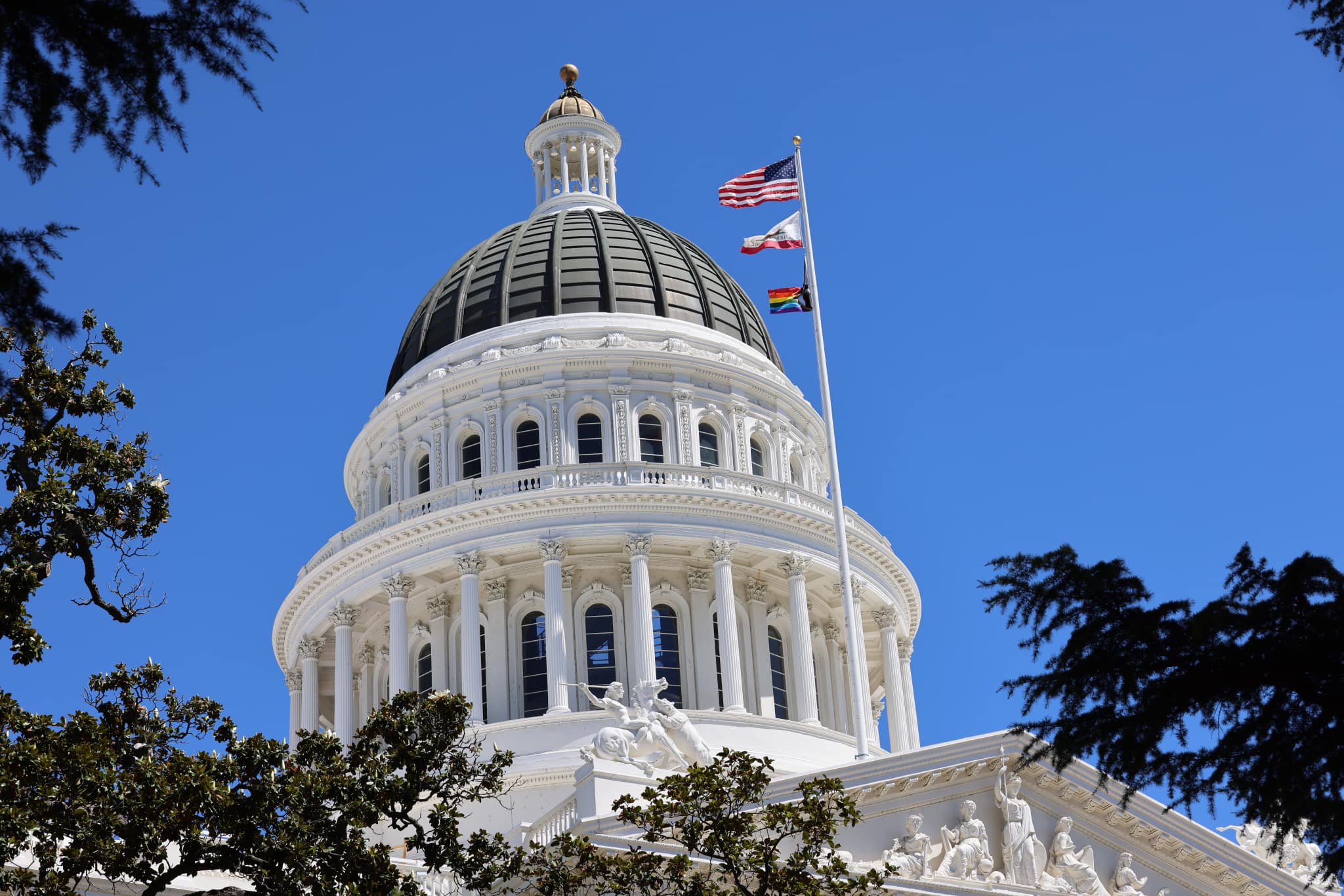
The two bills introduced by Republican lawmakers aimed at banning trans athletes from female sports, did not pass during yesterday’s committee meeting.
Assembly Bill 89 and Assembly Bill 844, have failed to advance in the Arts, Entertainment, Sports and Tourism Committee on Tuesday by a 2-6 vote on each bill. AB 89, introduced by Assemblymember Kate Sanchez (R-Rancho Santa Margarita) and AB 844, introduced by Assemblymember Bill Essayli (R-Riverside), were both rejected by California lawmakers.
“If these members and their counterparts were truly committed to addressing the inequities and safety concerns women and girls face—in sports and everyday life—they would be joining the frontlines in the fight for equal pay, stronger protections against domestic violence and sexual assault, and expanded healthcare resources,” said Tony Hoang, executive director at Equality California.
AB 89 and AB 844 are part of the nationwide coordinated effort led by extremists in Washington D.C. to sow fear and misinformation about transgender people—in particular youth—and attempt to erase them from virtually all areas of public life.
“Instead of tackling the real problems in our state like high inflation and rising healthcare costs, Assemblymembers Sanchez and Essayli continue to waste time and taxpayer money using transgender youth as political pawns in a shameful display of divisive politics and a thirst for attention.,” said Hoang.
AB 89 would have established a ban on athletes whose sex was assigned male at birth, from competing on a girls’ interscholastic sports team.
AB 844 would have reversed California’s law which currently allows trans athletes to participate in girls and women’s sports teams across all age levels, up to college level.
Tuesday’s hearing marked the first public debate on the issue in California since Newsom’s public comments about trans women in sports being “deeply unfair.”
On Friday, Gov. Newsom’s office confirmed it received a letter from U.S. Education Secretary Linda McMahon, stating that California could lose federal funds if it continued to allow trans athletes to compete in women’s and girls’ sports.
“As Secretary of Education, I am officially asking you to inform this Department whether you will remind schools in California to comply with federal law by protecting sex-separated spaces and activities. I am also officially asking you to publicly assure parents that California teachers will not facilitate the fantasy of ‘gender transitions’ for their children,” she wrote in the letter.
Equality California continues their partnership with the Legislative LGBTQ+ Caucus and other legislative partners in an effort to combat the passage of bills like AB 89 and AB 844.
“We are pleased these bills have failed and are thankful to those lawmakers who opposed this dangerous legislation in committee, particularly to the committee chair, Assemblymember Chris Ward, for his leadership,” said Hoang.
California
GLAAD’s Latine Honors celebrates culture and identity with packed house

GLAAD’s Spanish-Language & Latine Media created and produced the first Latine Honors, nearly blowing the roof off of Grandmaster Recorders in Hollywood, with a more-than-packed house full of stars.
The Latine Honors were created to celebrate the best in queer, Latine visibility and representation in entertainment media, advocacy and journalism. This event happened back-to-back-to-back with the GLAAD Black and Brown Honors and the 36th GLAAD Media Awards.
The Latine Honors were hosted by the hilarious stand-up comedian Roz Hernandez, who continues to make waves in the Los Angeles comedy scene and beyond.
“Every single time [GLAAD] calls, I answer,” said Hernandez on the carpet.
Hernandez says she is very lucky to be acknowledged by GLAAD and to join forces with them in the work they do for the LGBTQ+ community.
The Spanish-Language Special Recognition Awards were presented on stage by Harvey Guillén to “The Q Agenda,” a TV series on Latin Nation and “La Verdrag,” a news show on Canal Once, for their incomparable contributions to queer, Latine representation in media.
LA Blade had the chance to interview some of the Latine stars that graced the carpet to offer their two cents on issues affecting the LGBTQ+ community, including Harvey Guillén, Vico Ortíz, David Archuleta and members of “The Q Agenda.”
“I think now more than ever, it’s important for us to remember that we can’t be numb to the things happening around us,” said Guillén. “People are becoming less empathetic toward our community and other communities being attacked, so we have to remember to not lose focus. Do not lose focus and do not lose empathy.”
We also had a chance to catch up with Ortíz on the carpet. They are currently hosting a daily LGBTQ+ news podcast with Nay Bever, where together, they tactfully deliver the news that is relevant to our communities.
“I am co-hosting a daily news podcast called ‘Today in Gay,’ where we wake up everyday, we read the news and then report them to our queer community,” said Ortíz. “It’s quite a responsibility, but I’m also really honored to deliver [the news] with care and tenderness and tact.”
Ortíz was an honoree at the Latine Honors for their outstanding contributions to the media and entertainment industries as a Puerto Rican, non-binary, multi-hyphenated artist.
Archuleta spoke to us about his latest single Créme Bruleé, which incorporates a Latin flare to a pop tune.
“I’m so excited because I just released a new song, Creme Bruleé” said Archuleta. “I was really inspired by the pop girlies – Chapelle, Sabrina, Charlie [XCX], Billie [Eilish], and I just thought I wanted to channel that and I want to feel that confidence and that sexiness that I feel when I listen to their music, but I wanted to add a Latin flare to it.”
Keynote remarks were delivered by GLAAD President and CEO, Sarah Kate Ellis; welcome remarks were shared by Monica Tresandes, Senior Director of Spanish Language & Latine Media and Representation; and Gabe Gonzalez, host of GLAAD’s original ¡DÍMELO!, shared remarks about the attendees representing the Latine creators and media from across the industry.
-

 Opinions2 days ago
Opinions2 days agoGay for pay: Andy Lee and the changing face of content creation
-

 a&e features1 day ago
a&e features1 day agoNo longer just a go-go dancer, Prince Joshua debuts ‘Crowned’ EP
-
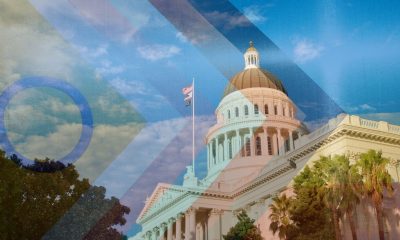
 Opinions2 days ago
Opinions2 days agoWhy is it important for cities to become LGBTQ sanctuary cities?
-
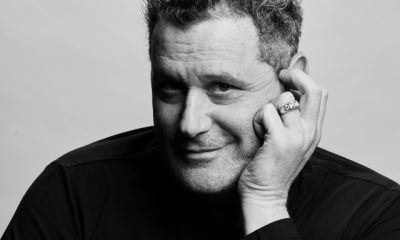
 a&e features2 days ago
a&e features2 days agoFashion icon Isaac Mizrahi brings performances to the West Coast
-
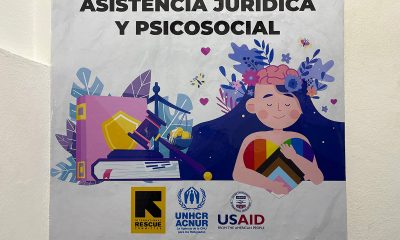
 Noticias en Español3 days ago
Noticias en Español3 days agoSuspensión de fondos de USAID golpea con fuerza a grupos LGBTQ+ en El Salvador
-

 Features7 hours ago
Features7 hours agoFinding love in queer Los Angeles with matchmaker Daniel Cooley
-

 Arts & Entertainment3 hours ago
Arts & Entertainment3 hours agoLA Opera brings back Pride Night for ‘Ainadamar’ production
-
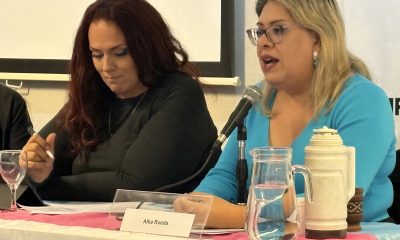
 Argentina4 hours ago
Argentina4 hours agoArgentina’s transgender community confronts ‘chaotic, desperate’ situation

